Hello and welcome to the second episode of the What China Wants podcast.
Today Sam and Stewart are exploring China’s global military and security footprint, asking how much international reach it has here, whether its war-fighting and logistics are up to the job, and whether it is better to look at what its doing from a more general security standpoint than just counting naval bases.
Note that you can also listen to the podcast on Apple, Amazon, or Spotify.
As always please do share, comment, and subscribe. We’ll be back next week looking at the impact on China from the Russian invasion of Ukraine. Many thanks for listening.
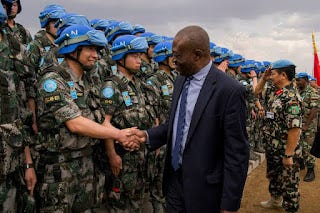
***
In the meantime, here is the transcript of the podcast:
Stewart Paterson: Hello and welcome to What China Wants. My name is Stewart Paterson and I'm joined as ever by Sam Olsen.
Sam Olsen: Hello.
SP: The subject of this week's podcast is an introduction to China's military and security global footprint. So Sam, you're the expert on this, but before you start I just wanted to read out a few quotes from China's paramount leader of the moment, Xi Jinping, and ask you for your thoughts on them. So there are a few things that strike me about these, but let me have a go here.
“Always listen to and follow the Party's orders and march to wherever the Party points”.
That was Xi Jinping, addressing the PLA on their 91st anniversary. The head of the CMC [Central Military Comission], this article goes on to say - and this is from the Chinese People's Daily - it also urged the armed forces to bear in mind the sacred duty of fighting for the people as the country set out its military civilian integration as one of its key national strategies.
“I firmly believe that our heroic PLA has the confidence and capability to defeat any intruder. Our heroic PLA has the confidence and capability to safeguard the nation's sovereignty, security and development interests.”
So Sam, clearly the Chinese Communist Party and the PLA are very closely linked. Can you elaborate and explain that for our listeners a bit?
SO: Yes, sure, thanks for those quotes Stewart, they do bring it home as to the closeness between the Peoples Liberation Army and the Party. And it is a very different model to that in the West. To be sort of straight down the line, the PLA is the armed wing of the Communist Party and that is a very different relationship to say the UK, where that the armed forces swear allegiance to the monarch and not to the government of the day. Whereas in China they do swear allegiance to the Party, which is therefore the government. What this means is that the PLA, and the Air Force and the Navy associated with it, are in effect just tools of whatever the Chinese Communist Party want, and that has been the case since the establishment of the Communist Party in China in the 1920s.
SP: So basically what you're saying is the relationship is as if the Conservative Party was in charge of our own military here or the Democrat Party were in charge of the military in the United States. That's the kind of constitutional setup that China has, is that right?
SO: Yes correct, I'm sure there are people within the Conservative Party and in the Labour Party, of course, who would like their own armed wings, but it's probably for the best that doesn't happen. That hasn't stopped it in China, and the whole raison d'être of the PLA is to do what the CCP wants, and to keep the CCP in power.
SP: So Sam, Xi Jinping is the head of the Central Military Command, so that is presumably a very important title for him in addition to being President of the country and also General Secretary of the Communist Party.
SO: Well, what's important when we are looking at what China is doing in terms of its military influence around the world, is that you have two parallel organisations, exactly as you did with the Communists in the Second World War in the Soviet Union. We have the military side, and we have the political side. This is being commented on a few times, the fact that within the Chinese Navy, the People’s Liberation Army Navy or the PLAN, they have the captain of the ship, but they also have a military commissar type person who can in theory, overrule what the Marine captain of the ship is doing. That makes it difficult when you're trying to work out if you've got American ship and the Chinese ship coming together, who is it that takes the final decision as to whether the ship should swerve, or crash into the American destroyer. As with everything within the PLA, it's ultimately related to the CCP, and it's hard to know where one side starts when the other side doesn't.
That includes the economic side as well. There's been pushback a bit recently, but you know, in the last 20, 30 years we’ve seen an enormous amount of a crossover between the economic interests of the country and the PLA. For example the founder of Huawei, of course, was famously from the People Liberation Army.
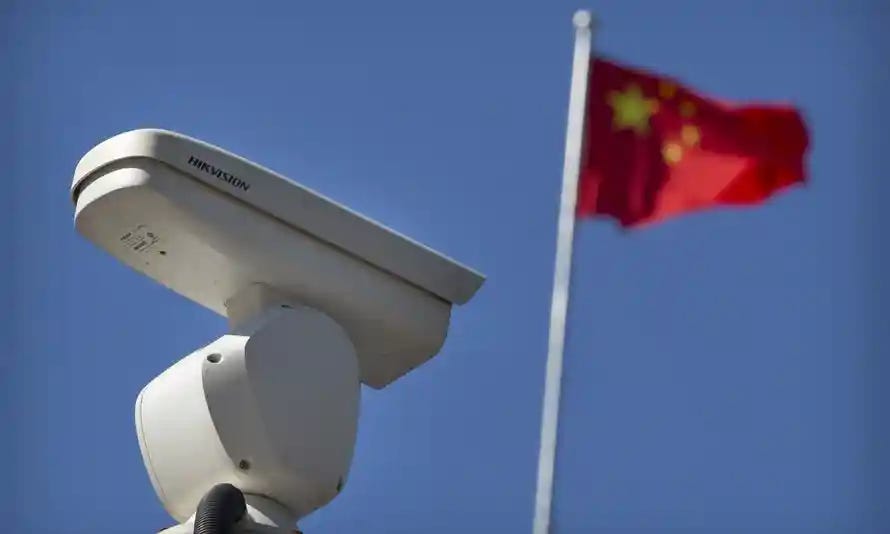
SP: Of course, and we'll have more on Huawei shortly I'm sure. So, is China actually a global military power, how has their footprint expanded and should we be worried by it?
SO: A good question. So there is a lot of worry about China's ability to conquer the world, but I don't think that is really the case. And to put it into comparison, China has only got a couple of overseas bases that we know of - well, one really, and a few others potentially. Whereas America has approximately 750, and the UK has many, with one report recently suggesting that the UK has 145 different military installations around the world. I'm not sure it's that high, but there's no doubt that the UK and even France, both have far more military bases around the world than China does.
But that doesn't necessarily mean that China doesn't want to be a global military power, and in fact they have specifically said over recent months and years that they do want to increase their footprint, for example, in strategically important chokepoints like in the Strait of Hormuz, they've said that they will actively manage those areas, including, we think, through military means if it impacts on China.
This is the long answer, but to put it in shortened terms, they're not a military power of global note now, but that doesn't mean that they aren't actively increasing their footprint in the military sense, but also the military sense and the security sense.
SP: OK, so let's look at things a little bit here through China's perspective. China is the largest trading nation in the world. It has a really quite chronic dependency on fuel imports, particularly oil through the straits of Hormoz and through the Malacca Strait. It's quite dependent on trade for food security as well and of course key inputs into its industrial complex, so wouldn't any country faced with these kind of strategic challenges quite naturally look to play a role, either collaboratively with other countries or on its own, to secure those sea lanes to ensure the continuing function of its society. It would be quite natural wouldn’t it?
SO: It really is, but a lot of people in the West are fearful of it because they see the fact that China is trying to push its influence, not just in military terms but in many other terms, especially in the economic sphere, and that the military side is just maybe the support for its other initiatives. I think that many in the West who think that are quite right to be worried if that expansion of China's military and security footprint does start to give it much more leverage and to undermine the West and the Western ability to control trade and to dominate international relations and the way it has done for last more couple of hundred years.
SP: So in China expansion then overseas, it's expanding military footprint, what bases do they actually have and what bases or potential bases could you identify as ones that they would deem most desirable?
SO: Officially the only base they've got at the moment is Djibouti in East Africa. People might know that Djibouti is also home to a French base and an American base, so it's making a lot of money, I suppose from that. But there are accusations that China is about to open a naval base in Cambodia in Ream, which is a port. There's so-called evidence of China dredging to make it a deep water port ready for their military vessels to come in. You also have accusations, by the Americans especially, that China is trying to open a military base in Central Asia and Western Africa, perhaps Equatorial Guinea, and even other places in Asia - although the list does seem to change quite a bit depending on who you talk to. But in reality Djibouti is the only place now.
Of course you have the South China Sea Islands, which are not necessarily military bases, but more military forts. The one that's been in the press recently is about the Solomon Islands, but that is not just a military base, that is very much a security relationship with China which may become a military base. I think that's an important note: China doesn't just look around the world and say we want to open a military base like a Royal Navy shipyard or something like that; they're very much looking to integrate defence and security and use one to help the other, and that is where you mention about the Military Civil Fusion bit comes in.
SP: Yes, I'm glad you mentioned this Sam, because our listeners might well have read a certain amount about China’s sort of extraterritorial reach with regard to Uyghur dissidents, for example, or critics of the regime, or for that matter just straightforward criminals who fled justice in China, also sort of financial crimes - you know there are large number of reported perpetrators of financial crimes who have fled China. So what's that all about?
I mean, listeners might well have heard of Operation Skynet. Does China actually have the ability to extract people and bring them back to the mainland to face justice and are there examples of that?
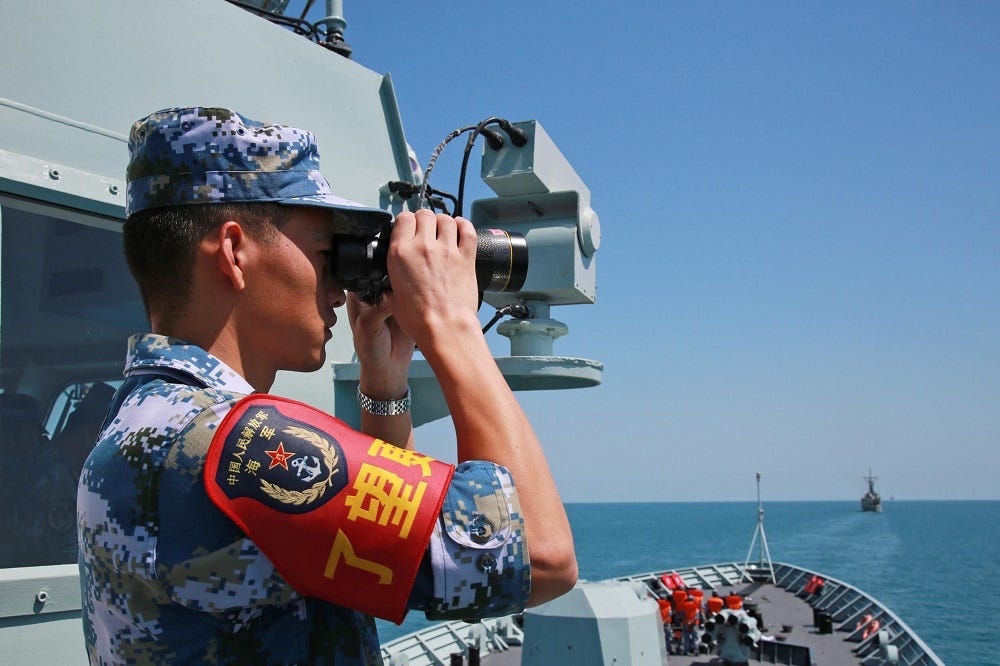
SO: So China's security focus, which is different to its military focus, has long being sort of ignored by many until the Uyghur stuff started to happen and people suddenly realised that China does actually have quite a long arm of the law around the world. There's a few things that need to be remembered. First of all, is that under Xi Jinping the concept of overseas Chinese had changed. It may sound a bit sort of pernickety, but it's important for this conversation because until recently, you had overseas Chinese who'd been living abroad for centuries maybe, and you might have had people that moved out of China the last few years. Now, of course, people who have moved out in the last few years, if they've done something wrong in China, it's quite legitimate for the Chinese authorities to request, and being extradited back. It's what we do, it’s what lots of other countries do, but the issue is that Xi Jinping has basically said that all Chinese living abroad, no matter how long ago your ancestors left the mainland, you are now, in essence, beholden to Beijing. This hasn't started to percolate down into active security measures as far as we understand, although if anyone got any evidence for that, let me know. But what it is, is laying the groundwork for China's long arm of the law to extend to basically anyone that it thinks it should be subject to Chinese laws.
That links very much into the national security law where Beijing’s been looking to bring all civilian and military firms under the control, or at least under the dominance of the Chinese central planners when it comes to building out the military. So there is a distinct trend being pushed by Beijing over the last few years to make sure that anything to do with China, whether it’s people or companies, that they all owe their allegiance and strength to supporting the Communist Party. It’s as simple as that.
SP: OK, So what you're saying here is that Xi Jinping is trying to put in place an apparatus that means that anyone of Chinese ethnicity, no matter what their actual nationality is can be held accountable to the Party.
SO: That certainly seems to be the way that they're going, yes, and linking that back into their global defence and security footprint, if we just look at the military side, you might think, well, they're not that that successful, they've only got Djibouti, maybe a few other bases.
But it's the security side, which you really need to look to. For the Solomon Islands, and we'll do a separate podcast on that, is interesting because it's about security cooperation and the Chinese may also have the ability to put ships down there. It really starts off by looking at the police deployments there by China and this is something that China has been doing in other countries as well, for example Cambodia or Laos or other countries in Southeast Asia, and they're trying to do elsewhere around the world too. And this is all about security arrangements, not necessarily defence arrangements. But if we just look at the military side it can be slightly deceiving in terms of their reach. At the end of the day, why are they doing all this? And that is a question that I think we need to explore a bit more as well.
Is it because Beijing are looking to actively control people around the world of Chinese heritage just for the sake of it? Or is it actually part of trying to keep control at home?
SP: OK. Now Xi Jinping often talks about the importance of digitalisation and technology, and we know that China has deployed a heavy industrial policy aimed at sort of cultivating the industries of tomorrow, as it were, and that China takes its self-sufficiency in these industries extremely seriously. What role does technology play in China's military and security footprint globally? Should we be viewing companies such as Huawei as being in the vanguard of spreading China's military footprint? Or are these simply commercial entities engaged in in global trade?
SO: So as I mentioned earlier, the national security doors in China now mean that every single person in the company has to support the national security apparatus basically, and that includes Huawei. And so when a few years ago, there was all this talk by Huawei, especially in the UK, around the fact that was an independent company, and the fact that it would never sort of divulge any secrets, it was just not true. They are compelled by law, at the risk of their people going to prison or disappearing in a slightly less judicial way, of doing exactly what the Chinese authorities want them to do. And that's China is prerogative to be able to put that in place, but to deny it is slightly disingenuous. The important thing is that the security apparatus is very much linked now to the digital side and what we're seeing is a huge push by China to allow or facilitate its technology companies to spread around the world. There is a more innocuous side it - TikTok and maybe some e-commerce - but perhaps also a more interesting side, that is the use of surveillance cameras, of border control machines, etc, many of which are linked into the establishment and the building of national digital infrastructure.
So the way it works is simple. China will say to Country X, “We’ll build out your 5G networks, we’ll build out your smart city initiatives, and within those initiatives we will put in surveillance technologies”. All of that together means that there is control by Chinese companies - and therefore the Chinese state by extension - on the digital infrastructure of that country. Where it becomes more nefarious is as the digital infrastructure spreads, and you get the adoption of China GPS equivalent, which is called BeiDou, into running transportation systems or into running security and military equipment whether it’s missiles or whether it's planes or whatever it is. You suddenly realized that the country has gone from just allowing a 5G network to be built to that country being wholly dependent digitally on China, which gives China huge influence in almost every sphere of modern life over that country.
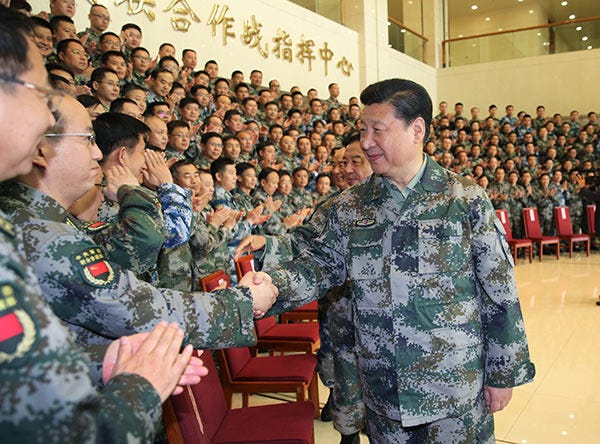
SP: So what you seem to be saying Sam, is that the number of bases that a particular country might have overseas or the number of ships that a country might be able to deploy into any region is really a very poor measure of the military and security footprint because it's so multifaceted now through technology, data, etc that we need a new paradigm of measuring capabilities. Would that be fair?
SO: Yeah, and if you take Clausewitz, the German military theorist from many centuries ago, he said war is politics by other means, and what we're seeing now is the evolution of war and security concerns to be much more technology-led and to be spread around many different areas of life. If you look at the Russia Ukraine side, there something that's become very apparent is the impact on world grain and food security because of the outsized impact of Russia and Ukraine on grain exports. And so that obviously has massive security implications internally for countries. So you're right, we do need to move beyond just looking at how many bases abroad a country has to see what the impact is the influence of a certain nation is in terms of its ability to push and influence the national security autonomy of another state.
SP: Now I'm sure there's been some listeners to this who are saying, well, look at Russia's performance in Ukraine relative to what the various intelligence agencies told us Russia was capable of and on the evidence so far it would perhaps suggest that people massively overestimated Russia's military capabilities. Is there a danger that we're making the same mistake here with China in terms of overblowing the importance of their global footprint? And I suppose that would also link to another question, which is when people measure defence expenditure between countries, they tend to do it in sort of nominal terms, but does China get a lot more bang for its buck when it spends a dollar on defence than America does?
SO: We've got a few things there in terms of whether America or China is spending more. There are debates about what about the actual veracity of China's defence budget. But at the end of the day, the advantage in terms of spending power is certainly with America. China are in fact spending far more on internal security than external defence. But bear in mind also that America, as much as its critics, will tell you has spent the last sort of 50 years fighting wars in every corner of the world. Its military is very well adapted to fighting in different areas, different countries and China’s isn't. And the last major war the Chinese fought was in 1979 when it invaded Vietnam and got a very bloody nose as a result. So there simply isn't the expertise in within China to compare and not only that, but it's logistics; now many people would have seen the struggles that Russia is having with its logistics in in Ukraine and, and that's certainly the case with China in terms of its abilities. America has far superior global logistics than China does in terms of ships in terms of air support, etc.
SP: OK, so that's interesting, can I pull you up on that? Because presumably China’s commercial actors, particularly state-owned enterprises but more generally just commercial actors, are there to support any potential logistics operations that are required. If you look at China's ownership of ports around the world or their ownership of merchant shipping and Huawei’s development of logistics software and port solutions, I would have thought that the likes of Costco and other state-owned enterprises involved in logistics globally would have unparalleled reach and an unparalleled ability to support Chinese military operations around the world, is that not the case?
SO: It might be, but there is no real integration at the moment because they haven't really had the experience between China’s private logistics capabilities globally and China’s military. Now it could be that as and when a war started that that was something that came together very quickly, but at the moment the advantage again is with America and the West, because we've just got greater experience in in terms of logistics and getting things moved around the world for military purposes.
SP: So is that what Xi Jinping means when he talks about military civilian fusion or is there another meaning to that?
SO: No, there is that, but it's also about the development of technology. For example, dual-use technologies in self driving cars, which can also be used to guide missiles as well. And this is a bedrock of military development within China to make sure that they take as much as they can from the civilian world. And a great example is graphene, the new wonder material invented in the UK, but the National Graphene Centre made the mistake of employing an intern from the People’s Liberation Army and it wasn't the surprise that very shortly afterwards graphene started to be used within China. In fact there is now approximately 4000 companies involved with graphene and graphene production in China compared to perhaps a couple in the UK. Those civilian usages for graphene are very much being used by the People Liberation Army as well.
You have that in the West, the connection between civilian and military, but it is much more top down in in China and that’s a specific policy pushed by the Chinese to get their military ready to be able to withstand or even confront the West.
SP: So what you're describing there really is a sort of militarization of the entirety of China's economy at an extreme.
SO: In essence, it hasn't got to that stage yet, but as and when war happens, if indeed it does then China is expecting its whole economy to be quickly moved into warfighting mode.
Whether that would work or not is a different matter, but at least that's the theory.
SP: Well, that's a scary thought.
SO: Well, I think the most important thing to note about China global security and military footprint is that it might sound big, but it's untried, untested, and the West very much has the advantage in terms of experience and in an accumulative spend.
But the question is, does China want to be a global military power or does it actually just want to be able to defend its core interests in part of the world? A really good quote that comes to mind always when I'm thinking about this is from Jack Ma when he was questioned about the fact that eBay was so much bigger and so much more resource laden than Alibaba. He said ues, well, eBay might be the great white shark in the ocean, but Alibaba is the crocodile in the Yangtze and we will defeat him if he ever comes on shore here, and I think that that is certainly what Chinese military and security planners looking at with regard to maintaining China’s position in its own backyard. It’s got a huge fleet. It’s got apparently very good missile technologies, although they're untested, and so if there was going to be something happening in its own backyard for example, Taiwan, I think that's a very different proposition to trying to imagine China conquering huge waves of Africa, or Europe or something like that, which is really unfeasible at this level.
But at the same time, watching its security apparatus push abroad does mean that it is more likely it will be able to control what its own people are doing abroad, but also it gives it leverage over other countries in terms of especially domestic security situation and I think it's more important for commentators to look at that and the influence of China on the domestic security situations of country XYZ than just saying how many bases China has got, because that is meaningless.
SP: So Sam, thanks very much for that, a fascinating introduction to China's military and security global footprint. Next week we will take this a bit further in discussing the impact of the Russian invasion of Ukraine on China and how that might play with China's interests.
SO: And you might actually get a chance to do some answering questions that suits you, because I'm going to ask you a lot about the economic side as well. Are you prepared for that?
SP: Absolutely, and I think the economic consequences are quite far reaching actually both in terms of a rejigging of global trade patterns, not just in energy, but in resources generally, but also in what reaction that the Ukraine-Russian war, has induced from the European Union, from Japan, and other democracies in terms of looking at the resilience in their supply chains. So that should be an interesting discussion.
SO: Brilliant! Well thanks very much for listening and we'll be back next week with more What China Wants.






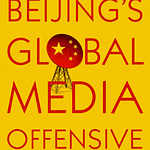
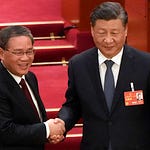
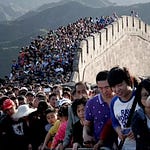
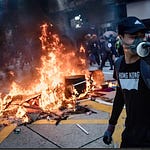


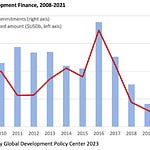
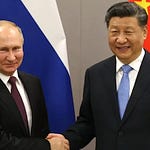
An Introduction to China's Global Military and Defence Footprint